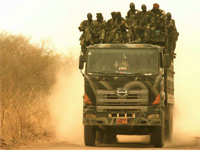
The recent volatility of the Sudan-South Sudan relationship raises important questions about why peace and stability between the two countries is so tenuous. From interviews conducted in Juba, South Sudan’s leaders appear open to continued talks and to the establishment of improved relations with Khartoum, especially in response to international pressure to do so. But there is a perceptible shift within the leadership in Juba toward disengagement with Sudan.
The dominance of hardliners in Khartoum politics, a long history of broken agreements with Khartoum, Juba’s doubts about the international community’s ability to fairly mediate between South Sudan and Sudan, and a post-independence sentiment that South Sudan must assert its sovereignty in response to continued Northern aggression have all contributed to a growing feeling that negotiations with Khartoum may not be the best means of achieving Juba’s strategic interests. But Juba’s reactions to Khartoum remain sensitive to cues from the international community, a legacy of international actors’ deep involvement in the negotiation of the Comprehensive Peace Agreement and support for the successful independence of South Sudan. Maintaining a positive image before the international community is still critically important to South Sudan’s leaders.
Negotiations remain the best means for the two parties to settle their differences and for South Sudan to resolve its priority concerns—territorial- and security-related—with Sudan. To rebuild Juba’s confidence in the negotiation process, international actors with the leverage to move the parties toward an agreement and the resources to help implement it must throw their weight in a concerted manner behind the African Union High-Level Implementation Panel, or AUHIP. The coordinated influence of the United States and China, possibly within a forum of key international stakeholders, coupled with continued attention by the U.N. Security Council and the African Union Peace and Security Council, is crucial to this end.
Peace between the Sudans depends on two parallel peace processes. First, a process that leads to a comprehensive North-South agreement on issues related to the border, Abyei, and a transitional financial package that includes an oil arrangement. Second, a broadbased, inclusive process that addresses the center-periphery issues that underlie conflicts within Sudan. Without progress on this second front, any agreements made between Sudan and South Sudan will be untenable.

